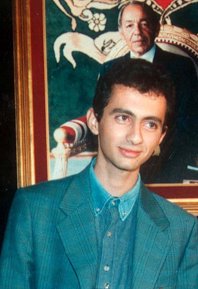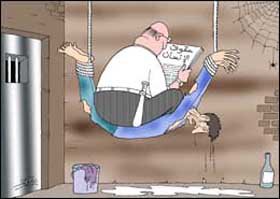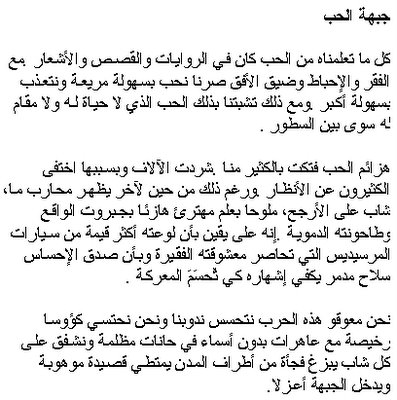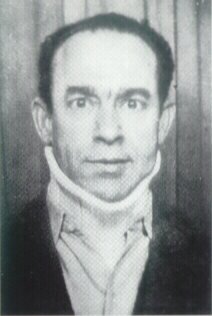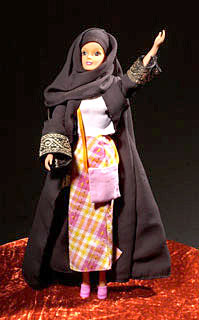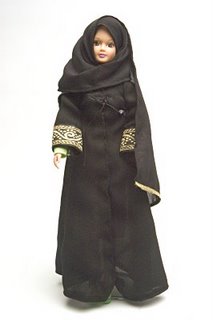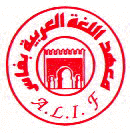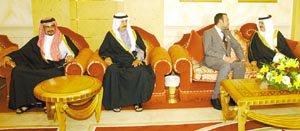The Jamestown Foundation often has very fine analysis and this piece by Stephen Ulf is no exception.
Arrests in Morocco Highlight the Expanding Jihadi Nexus -By Stephen Ulph
A wave of arrests that took place in early November in Morocco is illuminating for two reasons: the expansion of al-Zarqawi's influence outside Iraq, and the interconnection between jihadist activities on both shores of the Mediterranean. The series of arrests, beginning on November 11 in the cities of Rabat and Casablanca, has netted 17 Islamists suspected of links to al-Qaeda. Official sources claim that they have "dismantled a terrorist structure as it was being formed."
According to the Moroccan Arabic daily al-Alam, the terrorist network uncovered by the 17 arrests, Jama'at al-Tawhid wal-Jihad fil-Maghrib (‘the Monotheism and Jihad group in Morocco'), has connections with small groups operating near the Iraqi border that maintain close ties with senior members of the al-Qaeda. A security source quoted by the paper indicated the existence of a secret organization outside Morocco headed by an Iraqi and made up of 20 members, which entertained a plan to attack a Dutch intelligence HQ. Their plans were subsequently altered by the addition of a new Mor
occan member to the group who planned a larger operation in his home country: the targeting of a casino in Tangiers, the U.S. consulate in Casablanca and a number of Jewish synagogues. Others arrestees spoke of the production of poisons and explosives for subsequent use in Morocco. An interesting detail from the arrests was the indication of the al-Qaeda "radicalization course" undertaken by the new members, which included viewing jihadi films such as Jahim al-Rus, Badr al-Riyadh and Jahim al-Murtaddeen ("The Russian Inferno" the "Battle of Badr at Riyadh" and "the Apostates' Inferno"), as well as the productions of Iraqi networks on the Internet, such as Ansar al-Sunna, the Islamic Army and (al-Zarqawi's) al-Tawhid wal-Jihad (www.alalam.ma).
One of the fundamental activists behind the group's planned campaign in Morocco, according to al-Alam, is an Algerian national named Abu Baseer. He is considered to be an ‘emir' (commander) of al-Qaeda in Europe working under the authority of al-Zarqawi. One of the 17 arrestees is believed to have handed over letters addressed to Osama bin Laden "focusing on the mujahideen in Saudi Arabia and Algeria and on the creation of an al-Qaeda organization in the North African states." (www.alalam.ma).
In this sense, the pattern follows closely what is known from strategy documents concerning the next stages of the development of jihad: the preparation of support bases for al-Qaeda in Algeria and Morocco through the joining of forces of the mujahideen following their recruitment. Following this is their dispatch to military camps run by the Algerian Groupe Salafiste pour la Prédication et le Combat (GSPC), and then their training in the first phase for jihad in Iraq (or Syria in the event of American strikes). The second phase consists of their repatriation to Morocco in order to create sleeper cells, "to await the formation of a strong base from which to strike at economic and tourism targets, and Western institutions" (www.alalam.ma).
Funding and logistical support comes from Europe, as the Moroccan arrests demonstrated, mostly from channels in Spain and the United Kingdom, which funnel money acquired through voluntary contributions or petty crime. The current Moroccan investigations focused in particular on the role of Belgium. One of the leaders of the arrested group is considered to be Mohamed R'ha, a Belgian national of Moroccan ancestry, one of the operatives who had returned from ideological training in Syria to recruit members. On November 17 the trial in Brussels opened of Belgian and Moroccan nationals accused of belonging to a terrorist organization and providing logistical support to the Moroccan Islamic Combatant Group (Groupe islamique combattant marocain—GICM). This group was founded in 1997 by Moroccan veterans of the jihad training camps in Afghanistan and is held responsible for recruiting the dozen suicide bombers who carried out the multiple bombings at Casablanca in May 2003, which left 44 dead. The GICM is also suspected of carrying out the Madrid train explosions that killed 191 people in March 2004.
This second atrocity prompted Belgian police to close in on a GICM network based in the provincial town of Maaseik, which served as a logistics center and meeting place for the group's European leadership, where, according to the Flemish daily Het Nieuwsblad, discussions on the GICM organization took place on three occasions [www.nieuwsblad.be]. According to the prosecution case, as reported by De Standaard, one of the prominent members of this group, the Moroccan Abdelkader Hakimi, was designated by a fellow member imprisoned in France as the leader of the GICM. The 19-year old Hakimi is believed to have spent half his life on the run, spending ten years in Algeria, journeying with false papers to Libya, Turkey, Saudi Arabia and Malaysia, producing false identity papers for himself and for Afghan militant veterans and to have fought in Bosnia during the civil war [www.standaard.be].
The activities of Hakimi illustrate the skills and strengths of North African militant groups in Europe. The GICM is believed to number some few hundred committed radicals, supported by 1,000 to 2,000 sympathizers operating on both shores of the Mediterranean. Cells have operated in Italy, the United Kingdom, the Netherlands and Spain, the last of which announced on November 23 the arrest of 10 Moroccans and Algerians suspected of financing and giving logistical support to counterparts from the Algerian GSPC resident in Germany, the Netherlands, Britain, Belgium and Denmark.
The revelation of the ideological training of Moroccans taking place on the borders with Iraq has added urgency to Moroccan security concerns since the November 9 bombings in the Jordanian capital Amman. Following the arrests of the 17 Moroccans, one Abu Mus'ab al-Iraqi (styling himself as the "al-Qaeda correspondent") denounced on November 23 the events on the al-Firdaws jihadi forum and at the same time deplored the activities of Morocco's "secular" Channel Two TV broadcaster. His objection was to the vox pop interviews in the wake of the Amman bombings, addressed to "the ignorant, weak and base people … who spoke of Zarqawi inventing a new religion, and referred to his ‘bankrupt mind' " [http://alfirdaws.org/forums]. According to al-Alam, Moroccan intelligence is convinced that their country lies third on al-Qaeda's list of targets, after Saudi Arabia and Jordan, and remain on the lookout for al-Qaeda operatives crossing over from Algeria, and for senior members entering the country from Belgium [www.alalam.ma].
The Jamestown FoundationTags: Morocco, Fes, Jihad, Terrorism,
 Born in Fès, Morocco in 1948. A major figure in Modern Moroccan poetry. Ph.D holder, and professor of Arab poetry at the faculty of letters, Rabat. In 1971 he founded the literary review Attakafa Aljadida which was decisive in the creation of a Modernist sensitivity in Morocco during the seventies. He is president of the House of Poetry in Morocco, and one of its founders.
Born in Fès, Morocco in 1948. A major figure in Modern Moroccan poetry. Ph.D holder, and professor of Arab poetry at the faculty of letters, Rabat. In 1971 he founded the literary review Attakafa Aljadida which was decisive in the creation of a Modernist sensitivity in Morocco during the seventies. He is president of the House of Poetry in Morocco, and one of its founders.

